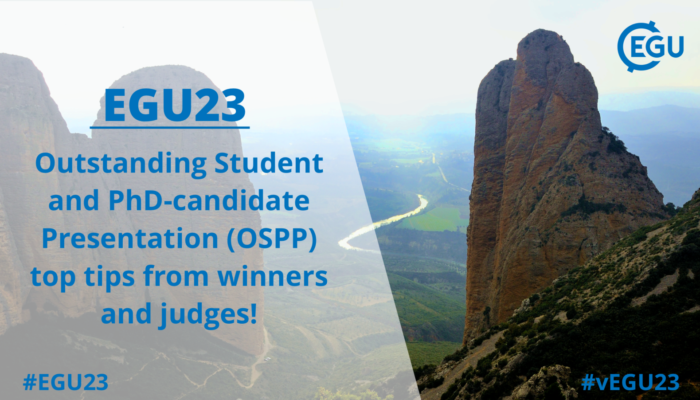
Every year at the General Assembly hundreds of students present their research with a lot of time and effort going into preparing these presentations. With the aim to further improve the overall quality of poster presentations and more importantly, to encourage Early Career Scientists to present their work in the form of a poster, the OSP Awards (as they were formerly known), were born. Since the 2016 General Assembly, PICO presentations have been included in the awards, which have been renamed to Outstanding Student and PhD-candidate Presentation (OSPP) Awards.
“There are a thousand posters in a hall, and they are all competing for attention,” highlights Niels Hovius of GFZ, German Research Centre for Geosciences and a former OSPP Judge for the Geomorphology Division, “so, you need to stand out a little bit.”
But, how can you make sure your poster or PICO is a great presentation which achieves that?
This year we asked two OSPP winners for their tips to give a great OSPP presentation! Here is their advice:
 “My name is Tullia Calogiuri and I joined last year’s EGU as a first year PhD candidate from Wageningen University & Research. My tip for a strong presentation is: use less words and be more creative by using more (self-made) illustrations. Illustrative overviews not only help to better explain a concept, but attract the audience too!”
“My name is Tullia Calogiuri and I joined last year’s EGU as a first year PhD candidate from Wageningen University & Research. My tip for a strong presentation is: use less words and be more creative by using more (self-made) illustrations. Illustrative overviews not only help to better explain a concept, but attract the audience too!”
Tullia Calogiuri, PhD Candidate, Wageningen University & Research, The Netherlands
 “As a 2022 OSPP winner in Biogeosciences, I would like to share some tips to make your oral presentation successful at the EGU. First, have a clear story to tell and keep it simple. Focus on the main points, the most important results. Don’t worry; there will be plenty of time after each session or even during coffee breaks to talk in detail with people interested in your work. Use high-resolution figures or images (resolution of at least 300 dpi) in your presentation slides and avoid tables as much as you can. Avoid combining more than two figures in a single slide because it is very difficult to read slides when they are fully loaded with a lot of information. And try to use text as little as possible. Don’t forget people are there to listen to you, not to read complex tables with a series of numbers! Always add a takeaway sentence at the end of each slide. Each slide should address a specific point of your story or presentation and a short sentence at the bottom of the slide or figure summarizing this will help the audience follow your main points.
“As a 2022 OSPP winner in Biogeosciences, I would like to share some tips to make your oral presentation successful at the EGU. First, have a clear story to tell and keep it simple. Focus on the main points, the most important results. Don’t worry; there will be plenty of time after each session or even during coffee breaks to talk in detail with people interested in your work. Use high-resolution figures or images (resolution of at least 300 dpi) in your presentation slides and avoid tables as much as you can. Avoid combining more than two figures in a single slide because it is very difficult to read slides when they are fully loaded with a lot of information. And try to use text as little as possible. Don’t forget people are there to listen to you, not to read complex tables with a series of numbers! Always add a takeaway sentence at the end of each slide. Each slide should address a specific point of your story or presentation and a short sentence at the bottom of the slide or figure summarizing this will help the audience follow your main points.
Prepare your talk in advance. Practice a lot. Speak clearly, not too slow, not too fast. This is especially relevant if you are a non-native speaker. Prepare your speech if needed. Make a test presentation in front of your supervisor or colleagues many days before to improve your talk and slides. Try to keep eye contact with the audience and avoid reading. And don’t forget that this is a learning experience. In addition, upload your presentation many days in advance and check to avoid surprises. Lastly don’t forget to dress appropriately. Yes, this is also an important point to pay attention to. Your outfit matters. Although there is no official dress code at the EGU, don’t forget that presenting at the EGU is a unique opportunity as a student, and you are there to do your best. It is like a formal appointment, so dress well. As a guide, adopt a business casual dress code.”
Steve Kwatcho Kengdo, PhD Candidate, University of Bayreuth, Germany
At the 2015 General Assembly we spoke to some of the judges and past winners of the award and asked them to share their thoughts on what makes a top poster presentation. We put their top tips together in this short video, which gives you a good idea of the key elements you ought to be thinking about when preparing your poster or PICO presentation.
If you are participating in OSPP, don’t forget to attach the OSPP label (blue PNG, yellow PNG) to your poster board. Alternatively, you might include the label in the poster itself. If you participate with a PICO, you are kindly asked to add the OSPP label to your PICO presentation header.
The OSPP awards are presented at the level of the EGU Programme Groups, a post from the blog archives also has full details of how the presentations are evaluated and you can also find detailed information about the award on the EGU website.
The EGU General Assembly is taking place in Vienna, Austria from 23 to 28 April. Check out the full session programme on the General Assembly website and follow the Assembly’s online conversation on Twitter (#EGU23 is the official conference hashtag).



